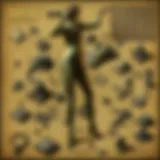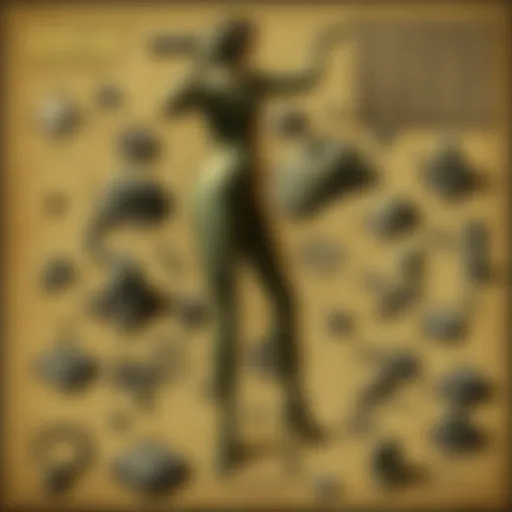The Chop Shop: Exploring Fallout's Dark Underbelly
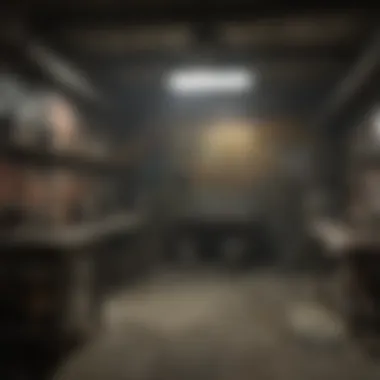
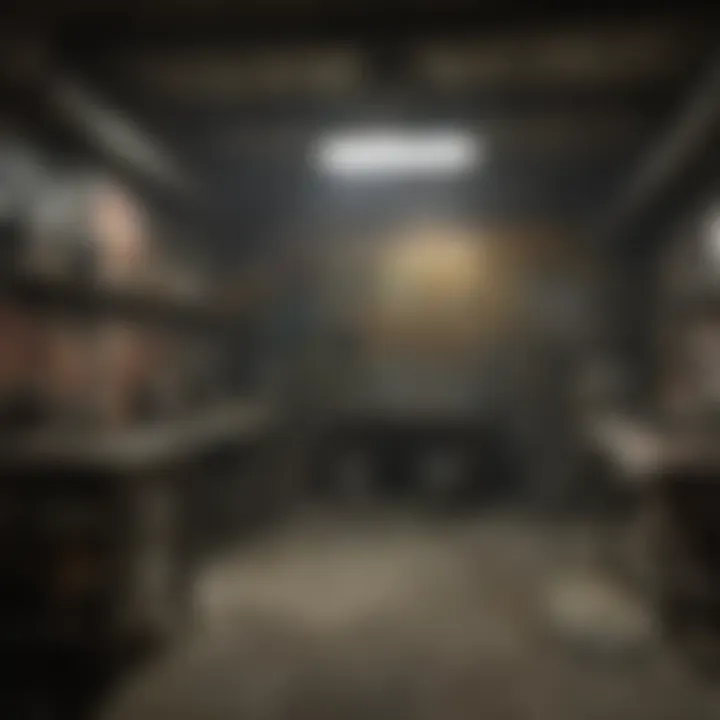
Intro
In the vast and chaotic landscape of the Fallout universe, the chop shop serves as a stark embodiment of survival, desperation, and moral ambiguity. These covert operations, often hidden in the shadows of crumbling cities and desolate wastelands, respond to the dire needs of a post-apocalyptic society. Through this lens, we’ll traverse the gritty narratives encircling chop shops, peeling back layers to expose how they influence the lore, gameplay, and communities formed in the remnants of civilization.
Lore Insights
Overview of the Fallout Universe
The Fallout universe paints a bleak picture of humanity's fallout—quite literally—following a nuclear catastrophe. Set against a backdrop of retro-futuristic aesthetics, remnants of the pre-war world blend with irradiated landscapes. This mix creates a rich environment where the consequences of societal collapse and human nature are on full display.
Key Historical Events in the Fallout Timeline
- The Great War (2077): This pivotal event saw the world’s nuclear superpowers engage in a devastating conflict, leaving most of civilization in ruins.
- The Formation of Factions: After the war, various groups emerged, such as the Brotherhood of Steel and the Raiders, each with its own agenda, leading to a fractured society.
- Rise of the Chop Shops: Amidst the chaos, chop shops became prominent, leveraging the need for weaponry and resources when conventional means no longer sufficed.
Deep Dive Into the Backstory of Major Factions and Characters
Chop shops often align themselves with various factions. For example, some might operate under the banner of the Raiders—ruthless survivors who thrive on the spoils of conflict. Others might act independently, catering to a diverse clientele from traders to desperate scavengers. Each faction’s relationship with chop shops illustrates the intertwined destinies shaped by choice, greed, and survival instincts.
The Role of Chop Shops in Fallout
The Birth of an Underworld Economy
Chop shops represent more than just a black market for stolen goods; they symbolize an underground economy that thrives in adversity. Bartering is commonplace, and that brings a level of complexity to item exchanges not typically seen elsewhere in the Fallout series. They rely heavily on the scavenging culture established in the fallout environment—a society willing to trade anything from caps to limbs for resources.
- Types of Goods: From salvaged technology to weapons, these operations release essential supplies that fuel the ongoing conflicts around them.
- Economic Implications: The existence of these chop shops raises the stakes, illustrating the socio-economic complexities players must maneuver through.
Player Interaction with Chop Shops
In various Fallout games, players often encounter chop shops both as allies and adversaries. Certain missions may task players with acquiring goods, disarming traps, or negotiating trades within the shady corners of these establishments.
Character Analysis
Detailed Profiles of Iconic Characters
Characters intertwined with chop shops often bear the scars of their choices, from ruthless traders to desperate operators. Their depth adds layers to the players’ understanding as they navigate moral choices in a lawless world.
- Doc M: A quintessential fix-it man who operates in the Mojave, his history reflects the duality of survival and ethics—often saving lives while profiting from desperate situations.
Relationships Between Characters in the Fallout Series
Character dynamics are frequently shaped around chop shops. Trust is a currency of its own, and betrayal can come in many forms—like a back-alley deal gone awry or a double-cross right when it matters most.
Character Development and Evolution Across Games
As players dive into the convoluted narratives, observing how characters adapt or devolve in response to the chop shop culture can provide profound insights into the game's overarching themes of redemption, survival, and the search for identity amidst chaos.
Fan Theories and Speculations
Popular Fan Theories About the Fallout Universe
Players have long speculated about the true origins and purposes behind chop shops. Are they simply a symptom of humanity's failure, or do they signify a deeper longing for connection in an isolated world?
- Theory on Pre-War Technology: Some fans believe that chop shops might hold secrets to pre-war technologies, leading to quests that involve unearthing ancient contraptions.
Discussion on Unresolved Plot Points
As much as the lore is rich, various unanswered questions linger, like who actually runs the most notorious chop shop in the Commonwealth, and what long-term implications it may have for the balance of power among factions.
Predictions for Future Installments in the Series
The ongoing evolution of the chop shop phenomenon suggests potential future narratives. Will they evolve into more legitimate businesses? Might some decide to take a stand against the rampant lawlessness? The speculative possibilities abound, as players eagerly await new content in the series.
"Every black market transaction tells a story—of need, desperation, and the choices that define us. Through the eyes of the chop shop, we see humanity’s fractured mirror.”
This exploration into chop shops serves as a testament to the intricate tapestry of choices, economy, and human connection in the Fallout universe. Each narrative thread leads us deeper into the underbelly of survival, leaving players with the conscience of their choices echoing in the post-apocalyptic landscape.
Understanding the Chop Shop
The concept of a chop shop serves as a magnetic pull in the Fallout universe. It’s not just some shady operation; it’s a vibrant thread woven into the fabric of post-apocalyptic life. At its core, understanding chop shops means grasping their role as marketplaces of the illicit and the unconventional. They symbolize survival, desperation, and, intriguingly, a certain type of entrepreneurial spirit born from the ashes of societal collapse.
In a world like Fallout, where the sun barely shines through the clouds of radiation and despair, chop shops are where the fragments of a once-thriving civilization come to be reconstituted into something new—albeit often illegal. Visiting these locations in the game offers players a chance to engage in morally ambiguous transactions, laying bare the harsh realities of life in a wasteland.
From mechanics of gameplay to narrative structure, chop shops are crucial elements that enhance players’ experiences. They force players to confront ethical decisions, weighing the value of scrapped tech against the backdrop of humanity's remnants. It's a space where the question of morality dances closely with the need for survival. Understanding these places opens the door to richer interpretations of the stories that unfold in the game.
Definition and Context
A chop shop, in the Fallout context, refers to any location where vehicles or tech are dismantled for parts. More than just a physical location, these setups provide a function within the gameplay narrative. They are often hidden in plain sight, tucked away in remote corners of the map or nestled between the ruins of classic Americana.
In the lore of Fallout, these establishments serve multiple purposes. They are crucial for scavengers trying to make ends meet, a source of income for raiders, and even an avenue for players to customize their experience with modifications and upgrades. As the narrative unfolds, players discover that chop shops carry a weight heavier than the junk that fills their shelves—they encapsulate the struggle for survival amidst decay.
Historical Perspective
The historical viewpoint on chop shops in Fallout is a reflection of our own societal issues magnified by the game's post-apocalyptic lens. While the concept of chop shops is not new, their evolution within the Fallout universe mirrors the breakdown of governance and law enforcement that follows catastrophic events. Players encounter traces of the "before" through old documents, scraps of conversation, and remnants left cluttering these strange markets of desperation.
From the early iterations of the Fallout franchise, the image of chop shops has evolved alongside the series itself. They have become symbols of resilience but also danger, highlighting the duality of survival in a wasteland. As one traverses the terrain, encountering these locations offers historical narratives, linking the decayed present to a bustling past.
In many ways, chop shops act as microcosms of the larger Fallout experience, highlighting not just the mechanics of gameplay but inviting reflections on what it means to exist in a shattered world where survival often means compromising one’s morals.
The Role of Chop Shops in Fallout
In the vast and intricate universe of Fallout, chop shops serve a pivotal function that goes beyond mere mechanics; they are deeply embedded in the narrative and the social fabric of the post-apocalyptic world. These establishments are more than just places for players to trade and modify gear; they are emblematic of the game’s exploration of survival, ethics, and economic ingenuity. Chop shops invite players to reflect on choices that blur the lines between right and wrong in a world where moral absolutes are blurred by harsh realities.
Chop shops carry a heavy load of narrative weight. They illuminate the day-to-day struggles of survival amid societal collapse, and the transactions that happen within them speak volumes about desperation, community, and the instinct to survive at any cost. They represent a kind of dark entrepreneurship, where illicit trade becomes a necessity rather than a choice. As such, chop shops are not merely settings; they are storytelling devices that enhance player immersion.
Narrative Functions
Chop shops are central to the storytelling landscape of the Fallout series for several reasons:
- Character Development: The characters that populate these establishments often have rich backstories, providing context to their motivations. They are more than just vendors; they are survivors navigating an unforgiving landscape, and their choices often mirror the player’s own moral quandaries.
- World-Building: Locations like the chop shop amplify the feeling of a lived-in world, showcasing the arrangements people make to adapt to their environment. In a world where civilization has crumbled, these shops highlight resilience and ingenuity, telling stories of communities that revolve around survival.
- Quest Integration: Many quests intersect with chop shop mechanics, driving home the importance of these locations in player progression and storytelling. Engaging in transactions can lead to deeper narrative threads and unlock new layers of the game's lore.
The role of chop shops is complex; they serve as a reminder of the world’s harsh reality while also embodying the community's spirit and resilience.
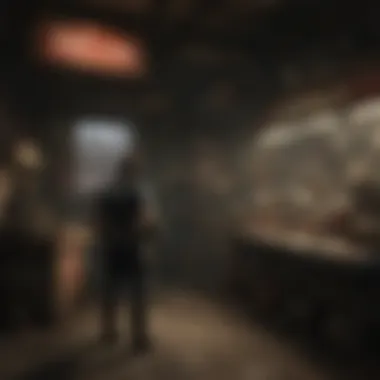
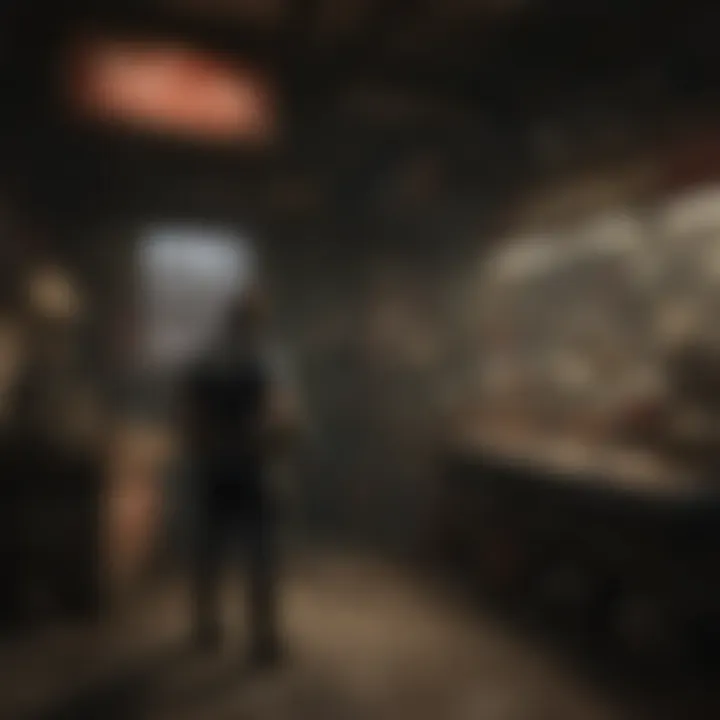
Gameplay Mechanics
Chop shops play a crucial role in gameplay mechanics, providing players with essential tools and opportunities to enhance their experience:
- Crafting and Customization: Players can use chop shops to modify weapons, armor, and other items. This ensures that players can tailor their gameplay style to suit their needs, allowing for creativity in combat and strategy.
- Loot and Trade: The ability to acquire and barter resources at chop shops is fundamental in a setting that emphasizes scarcity. Players can trade unwanted gear for much-needed supplies, creating a dynamic economic environment influenced by player choice.
- Economic Strategy: Players must navigate their financial resources carefully within these shops. Understanding market fluctuations and the value of goods becomes a vital gameplay element, reflecting real-world principles of supply and demand.
In sum, chop shops are multifaceted entities that enrich the Fallout experience, serving as focal points for character development, narrative progression, and gameplay enhancement. Their presence highlights the delicate balance of ethics and survival in a world turned upside down.
In Fallout's chaotic universe, chop shops are the forge where survival and morality meld, shaping players’ stories in profound ways.
Through their intricate design and rich contextual implications, chop shops anchor players in a world where choices reverberate beyond the immediate, inviting introspection on what it truly means to survive.
Key Locations of Chop Shops
In the chaotic and ravaged world of Fallout, the chop shops are not just mere back alleys where shady deals go down; they are pivotal hubs that shape the very fabric of survival in the wasteland. The locations of these chop shops are interesting, often hidden in plain sight or embedded in unexpected places, each telling a part of the larger story of the Fallout universe. Understanding these locations provides insight into the socio-economic implications of a society where the line between morality and necessity is often blurred.
Notable Regions in Fallout
The landscapes across the Fallout series are as diverse as the players that navigate through them. Each region features its own distinct flavor of chaos, and within these corners of the post-apocalyptic setting, several chop shops have earned recognition among players.
1. New Vegas:
Set against the backdrop of a shining neon oasis, the chop shops in this area thrive on the incessant demand for illegal modifications and salvaged parts. From the backrooms of small-time traders in Freeside to the larger operations emerging from Caesar's Legion, countless characters hawk their wares, living by their own set of rules.
2. The Commonwealth:
In the Fallout 4 landscape, the remnants of the old world are rife with chop shops adapting to new threats. In East Boston, where raiders and super mutants roam, the opportunistic engage in risky trade. Here, crude modifications can be found alongside stolen tech from the Institute, fueling the cycle again and again.
3. Nuka-World:
Sometimes referred to as the crown jewel of wasteland opportunities, the chop shops in Nuka-World reflect a twisted nostalgia for a past that no longer exists. The atmosphere teems with illicit trade, where the adventurous can sniff out tech from the remains of the Nuka-Cola empire, making the area particularly enticing as a place for players to explore and establish connections.
These regions are indispensable in painting a picture of how Fallout societies adapt to the extreme conditions forced upon them.
Hidden Secrets and Discoveries
Chop shops are not simply about trading; they encapsulate the intrigue of uncovering hidden treasures in a world that thrives on surprise. The discovery of a new plot twist or a hidden item often hinges on interactions with different chop shop locales.
"Every corner of the Fallout world has a secret, and chop shops are often the gatekeepers of those secrets."
Unraveling the Mysteries:
- Blueprints and Schematics: Sometimes, a dive into sabotage reveals blueprints that could unlock powerful mod options.
- Rare Crafting Materials: Random scavenging in the backroom of a small shop can lead to finding extremely rare materials, like The Orange Vault Boy! This crafty find could reshape gear or improve weapon performance greatly.
- Connections to Important NPCs: Engaging with locals often provides quests that can lead to deeper connections within the Fallout narrative, leading players to unexpected alliances or deadly rivalries.
As players immerse themselves in these hustle and bustle areas, it’s clear that each chop shop serves as both a practical pitstop for resources and a thrilling layer in the vast web of Fallout's rich lore. The choice of where to go isn’t merely a tactical decision; it reflects the inner workings of each character's narrative and ties innately to their journey through the wasteland.
Chop Shop Characters
Chop shop characters are the unsung heroes—or sometimes villains—of the Fallout universe. These beings bring life to the bleak post-apocalyptic world, adding depth and complexity to the chop shop narrative. They are the faces behind the operations, shaping the player’s experience and the mechanics of the game itself. Each character embodies a blend of attitudes, motivations, and backstories that can solicit a range of responses from players, presenting an opportunity for deeper engagement with the game’s themes.
Major NPCs and Their Roles
In any discussion about chop shop characters, the major non-playable characters (NPCs) serve as pivotal figures that paint a vivid picture of the chop shop ecosystem. They can range from ruthless raiders to savvy traders and even reluctant participants caught in the web of survival.
- The Mechanic: Typically found amidst the chaotic bustle of the chop shop, this character often specializes in salvaging parts and crafting new equipment. They know the ins and outs of scrap, turning yesterday's refuse into tomorrow's formidable gear. Their expertise can also present a lifeline for players in dire need of enhancements.
- The Dealer: This figure may not get their hands dirty in the same way as others, but they wield a unique influence. The dealer connects the players with an array of illicit goods, often bartering in secrets as much as supplies. They embody the concept of trade in a world where every item can be a matter of life and death.
- The Storyteller: This character often serves as a bridge to lore, relaying tales of the old world and lessons learned since the bombs fell. Players may come across them sharing stories in back alleys, framed by dim light and shadows, loaded with knowledge that hints at past glory or tragedy.
Each of these characters not only enhances gameplay but also infuses the narrative with authenticity, giving players a richer context of the world they're navigating.
The Underdog Stories
The chop shop is home to numerous underdog stories, stark narratives that resonate deeply within the human experience, even amidst the dystopian settings of Fallout. These tales often center on individuals striving against the odds—whether it's a character trying to escape the clutches of a life of crime, or a junkyard dog making a name for himself in a world that sees only rot and rust.
- Redemption Arc: Characters who were once entrenched in the underbelly may seek redemption. Perhaps a skilled mechanic regrets his past choices, prompting players to decide whether to help him rebuild his life or use him for their own gain.
- The Reflective Journey: Some players may encounter a character who, despite their dire circumstances, continues to hold onto dreams or remnants of the past, offering a poignant reflection of what life used to be like—a stark reminder of loss that carries emotional weight.
- Connection and Community: Chop shop characters often forge unexpected friendships. An unlikely alliance between a raider and a scavenger may blossom, highlighting themes of cooperation amidst strife. These relationships can sway player decisions, ultimately impacting game outcomes.
Underdog stories, when woven into the chop shop narrative, enhance the emotional depth, making players question not just their choices, but the very fabric of morality in the Fallout universe.
Through their roles and stories, chop shop characters elevate the game from mere escapism to a medium rich in narrative possibilities that can challenge players' perspectives.
Factions Involved with Chop Shops
The chop shops within the Fallout universe don’t exist in a vacuum. Their very essence is intertwined with various factions that populate the post-apocalyptic landscape. Understanding these factions is crucial to grasping the complex dynamics of chop shops and their interactions. These factions wield influence over not just the operations of these illicit enterprises, but also the moral, ethical, and economic implications they carry. In this section, we’ll peel back the layers of two significant factions: the Raiders and the Brotherhood of Steel.
The Raiders’ Influence
Raider groups are perhaps the most recognizable and notorious factions associated with chop shops. The very name of raiders conjures images of lawlessness, brutality, and chaos. However, there’s a more intricate reality at play here. Raiders often see chop shops not merely as places for illicit trade but as essential components of their survival strategy in the wasteland. These establishments can serve as hubs of weaponry and armor modification, allowing raiders to enhance their combat capabilities through scavenged parts.
The symbiotic relationship between raiders and chop shops can be broken down into several elements:
- Supply and Demand: Raiders are perpetually on the hunt for supplies, and chop shops provide a vital source of needed materials. They trade captured goods and scrap for forged weapons or makeshift armors, fueling the cycle of violence and survival.
- Strategic Locations: Many chop shops are built in locations where raider factions are heavily fortified, offering a sanctuary for dealings that might otherwise attract unwanted attention from law enforcement or rival factions.
- Innovation through Necessity: Facing constant threat, raiders often improvises in ways that lead to unique weapon designs or combat strategies that can only be produced in the frenetic atmosphere of a chop shop.
This dynamic means that even though raiders are often seen as mere criminals, their influence on chop shops contributes to the broader narrative of endurance and adaptation in a harsh world.
The Brotherhood of Steel Perspectives
In stark contrast to the raiders, the Brotherhood of Steel represents a faction focused on preservation and control of technology. They operate on principles of order, often viewing chop shops as dispensaries of chaos and misuse of technology. Their perspective on these operations is infused with an air of superiority and moral obligation, leading to tense interactions.
Some key aspects of the Brotherhood’s standpoint include:
- Technological Preservation vs. Destruction: The Brotherhood seeks to hoard and protect advanced technology, viewing chop shops as places where technology is appropriated and typically ravaged, which violates their tenets. They often regard the modification of technology without proper knowledge as reckless, echoing their mantra of safeguarding humanity’s technological legacy.
- Potential Allies or Threats: In some cases, they may leverage chop shops for their benefits, seeking hidden technology and parts that may have slipped through their fingers. This makes them both a potential ally and a significant threat, depending on how their objectives align with the chop shop’s operations.
- Direct Confrontation: The Brotherhood’s patrols often lead them to engage directly with raider groups or even rogue traders, leading to armed conflicts that can erupt in violence depending on how deals at a chop shop are perceived.
This divergence in values signifies an ongoing battle not only for technological dominance but also for ideological supremacy in the wasteland.
"In the bleak landscape of Fallout, each shop tells a story, reflecting the diverse cultures, conflicts, and choices that shape the universe."
The influence of these factions highlights that chop shops are more than just backalley operations; they are central to understanding the ethos defined by survival, morality, and conflict in the Fallout realm.
Ethics and Morality
Ethics and morality are crucial elements when engaging with the darker aspects of the Fallout universe, particularly regarding chop shops. The actions and decisions players make have rippling effects, raising questions about right and wrong in a world where traditional societal norms have crumbled. Players are placed in scenarios that often challenge their values, leading them to confront the harsh realities of survival versus morality. This duality creates a rich tapestry for narrative exploration, pushing players to consider not just their immediate goals but the broader implications of their choices.
Moral Dilemmas in Gameplay
In Fallout, moral dilemmas are not merely side quests; they are central to the gameplay experience. From helping a chop shop to acquiring parts for survival to choosing to dismantle illicit operations, players are constantly faced with choices that test their ethical frameworks. Specific encounters often evoke strong emotional responses, forcing players to weigh their options carefully.
For example, consider the quest involving a desperate character seeking to commit theft to pay a debt. Players can choose to either assist in this morally questionable act or steer the character toward a more honorable path. Each decision has the potential to alter relationships with NPCs, impact resources, and even change the overall state of the game world. In these moments, players are confronted with their values, and their actions often reflect deeper principles:
- Justice versus Survival: Is it right to turn a blind eye to wrongdoing if it benefits the greater good?
- Loyalty versus Integrity: Should players remain loyal to their companions even if it means compromising their own beliefs?
- Power versus Responsibility: How does one cope with the power to shape the world around them, while also being accountable for the consequences that follow?
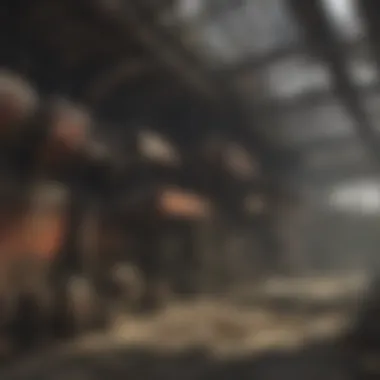

These encounters provoke players to engage with complex scenarios that provoke introspection, considering their moral compass alongside survival instinct.
Consequences of Choices
The consequences of choices made in chop shop scenarios can be significant, shaping future gameplay in unexpected ways. Fallout's world is unforgiving; the actions that players take can lead to ripple effects that may not be realized until much later in the narrative.
The nature of consequentiality is multifaceted in chop shop dealings. For instance, players might decide to partake in a chop shop's operations which could yield immediate material gain. However, aligning with these morally grey enterprises could attract attention from more noble factions, leading to conflict or even total eradication events later in the storyline. Conversely, choosing to dismantle a chop shop might secure the goodwill of a prominent faction, but could also lead to unemployment and suffering among the local populace that relied on these services for survival.
As a result, players must contemplate:
- The short-term benefits of their actions compared to long-term ramifications.
- The relationships with different factions that may shift based on their choices.
- The moral sacrifice made for personal gain versus the altruistic path that could lead to a more stable environment for all.
The importance of ethics and morality in Fallout's chop shop narrative cannot be understated. Players navigate a rich, interactive world where their decisions mold both the future of characters and the landscape of the game. Ultimately, exploration of morality enriches the player's experience, making their journey through the wasteland both a test of survival and a profound examination of conscience.
The Economy of Chop Shops
Chop shops in the Fallout universe are a fascinating anomaly, serving as a microcosm for the broader economic challenges present in a post-apocalyptic world. These establishments don't just exist to provide a means for scavengers to offload scrap; they encapsulate the social dynamics and survival strategies that players and non-playable characters (NPCs) navigate daily. The economy surrounding chop shops is influenced heavily by resource scarcity and the desperate measures individuals take to survive. As such, understanding this economy provides deeper insights into the motivations of the characters that inhabit this wasteland.
Trade and Barter Systems
Trade and barter represent the lifeblood of the economy in chop shops. In a world stripped of traditional monetary systems, items hold varying intrinsic values depending on the needs and wants of the parties involved. Players often encounter scenarios where they must assess the worth of their goods and negotiate effectively.
For instance, an old broken radio may fetch a price greater than a stash of caps in certain circumstances. This type of negotiation can hinge heavily on who the trader is—an armor-smith might place more value on items able to be refitted compared to a chem dealer who craves components for concoctions.
In this light, understanding the intricate web of needs amongst players and NPCs can enhance the trading experience. The barter system becomes not just a transaction, but a social exchange, fostering interactions laden with personal motivations and histories.
"In the wasteland, a dented can might be worth its weight in caps if it finds the right buyer at the chop shop."
Resource Allocation in a Post-Apocalyptic World
Resource allocation within chop shops is a reflection of the broader economic struggles faced throughout the Fallout universe. Players quickly learn that not all resources are created equal. Crafting components like nuclear material or rare weapons can be the difference between life and death. Players frequently find themselves weighing opportunity costs—deciding whether to spend resources on weapon upgrades or save them for potential trade later.
Moreover, the inequalities present in the distribution of resources lead to a sort of economic Darwinism within the chop shop ecosystem. Factions and players who control rich and diverse resource caches tend to dominate these economic interactions, securing better prices or even monopolizing certain goods.
In a world rife with the remnants of a once-thriving capitalist society, chop shops emerge as vital players in resource distribution and allocation. From salvaging parts from downed robots to bartering for medical supplies, they play a crucial role in navigating the treacherous waters of regard and resource management.
Chop Shops in Player Narrative
Chop shops within the Fallout universe play a pivotal role in shaping the player narrative. These underground establishments aren't merely places to procure parts or upgrades but are woven into the fabric of the player's journey. The interactions and experiences players endure when dealing with chop shops greatly influence their characters and choices, often reflecting the moral complexities of a post-apocalyptic society.
Player Interaction and Customization
Engaging with chop shops allows players to customize their experience significantly. At these locations, survival enthusiasts can trade scrap and loot for hard-to-find items and essential components. Vendors might offer various crafting materials, weapons modifications, or even rare blueprints. This interaction creates a dynamic environment where players can hone their skills, not just in combat but also in the art of negotiation.
The customization of weapons and armor through chop shops opens up strategies that might not otherwise be available. Players can tailor their gear to suit their playstyle – from creating silent weapons for stealthy approaches to bolstering defenses against the relentless wasteland threats. This personalization fosters a sense of ownership as players see their character evolve into a unique avatar shaped by their choices and the threats they face.
Moreover, dealing with various chop shop proprietors allows for diverse encounters. Each vendor carries their own personality and backstory, which can directly affect the items they sell or the stories they share. The relationships forged or severed with these characters can lead to unexpected outcomes, altering the course of one's journey.
Personal Stories and Experiences
Chop shops serve as a backdrop for countless personal tales within the Fallout universe. When a player steps into one of these establishments, they're not merely interacting with a game mechanic; they are stepping into a microcosm of post-apocalyptic life. Each interaction at a chop shop presents a chance to learn about the wasteland's struggles, survival tactics, and personal journeys of the characters entrenched in the underbelly of this world.
For instance, a player might encounter an NPC whose family was torn apart by raiders, prompting the player to ponder their moral standing while envisioning their own character's involvement in this bleak narrative. Stories like these deepen the emotional resonance of the gameplay, making every choice weigh heavier. Was it right to choose profit over helping a desperate character? That interaction can echo throughout a player's journey, influencing decisions in ways they might not realize until later.
In closing, chop shops are not just economic hubs but are critical to the rich tapestry of personal stories in the Fallout universe. They foster a unique blend of gameplay mechanics with narrative depth that engages players on multiple levels, making their experiences starkly personal while navigating the chaotic wasteland.
Cultural Significance
Societal Reflections
The chop shop concept in Fallout isn’t just a mechanic or a backdrop. It acts as a mirror reflecting the larger social dynamics at play in the post-apocalyptic world. Each chop shop showcases varying aspects of the human experience under extreme pressure. Take, for instance, the Raiders who run many of these operations; their lawlessness stems from desperation and survival instinct. These illegal workshops cultivate a culture of fear and power, highlighting how society can quickly devolve when civilization crumbles.
At the heart, chop shops symbolize the loss of traditional industrial ethics and the adaptation of human nature when faced with adversity. They encapsulate how alienated communities form around shared interests—whether it’s salvaging parts or breaking down stolen goods. These operations not only feed the underground economy but also represent the survivors' will to carve out a living despite dire circumstances. The impact on local communities and their relationships echoes themes of collaboration and betrayal in exaggerated ways, making players ponder the ramifications of moral choices.
Impact on Fallout's Lore
Chop shops play an integral role in enriching Fallout's lore, framing not just the economic landscape but also the socio-political dynamics that players navigate. They weave into the fabric of various narratives, creating more than just a backdrop; they are pivotal plot devices that deepen the lore. For example, the interaction between different factions at these chop shops can lead to alliances or fierce rivalries. The Brotherhood of Steel’s obsession with technology often puts them at odds with the raiders who exploit and dismantle it for profit.
McMurphy's Exchange in Fallout 3 offers an illustration of this clash. Here, the player witnesses direct confrontations between raider elements and more ethical survivors trying to reclaim their dignity amidst chaos. The lore weaves a rich tapestry where the fate of the Wasteland often hinges on these underground dealings.
Chop shops provoke deeper inquiry into post-war society, questioning not only how power is wielded but also how community bonds can emerge amid adversity. Such lore elements make chop shops crucial narrative strands within Fallout, prompting players to engage with the moral quandaries they represent. For fans and players, these immersive experiences guide their understanding of the world, making every transaction feel consequential.
“Within the mayhem of the Wasteland, chop shops emerge as pillars of survival, cloaked in shadows yet bursting with stories waiting to be unearthed.”
In summary, the cultural significance of chop shops goes far beyond mere storytelling; they illustrate the resilience and flawed nature of humanity as it grapples with a world torn apart. Understanding these elements enriches the gaming experience and sparks discussion on broader societal themes.
Chop Shop Design and Aesthetics
In the gritty world of Fallout, the chop shop stands as a twisted reflection of society’s collapse. The design and aesthetics of these establishments play a crucial role in immersing players in the harsh survival reality of the post-apocalyptic environment. They are more than mere resting places or centers of trade; they visually embody the chaos and creativity that define the Fallout universe. Each element of design tells a story, whether it be through scavenged parts or the ad-hoc structures that support a chop shop's rugged functionality.
Weapons and armor enhancements are salvaged and repurposed, showcasing innovation from desperation. This resourcefulness is often displayed in the form of makeshift furnishings and repairs, highlighting both the ingenuity of the inhabitants and the bleak circumstances they face. The materials used, a mix of rusted metal and faded signage, evoke nostalgia for a world long gone, all of which resonates deeply with players who explore these dilapidated environments.
Visual Elements
The visual aspects of chop shops blend seamlessly into Fallout’s iconically grim aesthetic. Bright neon signs flicker beside weathered concrete, while splashes of color from graffiti stand in stark contrast to the drab surroundings. This kind of juxtaposition not only draws the eye but also serves to establish the strange allure of these places amid the wasteland. Each location is distinctive, forming its own character through design choices.
- Graffiti and Artwork: The walls are alive with artwork that hints at the stories of those who frequent the chop shop—some pieces reflect rebellion, while others signify despair.
- Architectural Chaos: Make-shift repairs and unconventional construction methods characterize the chop shops. Salvaged pieces from old-world technology become functional and creative parts of the shop’s layout.
- Lighting: Harsh fluorescent bulbs often fight against the natural darkness of the wasteland, creating an atmosphere that is both inviting and threatening.
These visual elements work together to prompt players to ponder the lives of those within and the narratives that unfold in these make-shift havens.
Atmosphere and Mood
The atmosphere in chop shops is palpable; one can almost taste the desperation mixed with determination. There’s a constant buzz of industry, where bartering and deals take place in shadows. Sound plays a pivotal role here—hissing machinery, the clatter of metal tools, and the murmur of conversations form a symphonic backdrop of survival.
- Tension and Suspense: The mood can shift quickly from edgy negotiation to outright peril. Players must remain vigilant in these environments, as allies can swiftly turn hostile.
- Community and Isolation: While chop shops serve as gathering points, there is an undercurrent of isolation felt by many of the inhabitants. The weight of past choices lingers heavily in the air, reflected in the weary faces of the residents. Players can sense the burden behind each character’s eyes.
- Contrast of Life and Death: Amid the chaos, there are interactions that remind players of the fragility of existence in the wasteland. This duality helps to construct an engaging player experience; the potential for both community and betrayal shapes the player’s approach to each encounter.
Legality and Law Enforcement
In the chaotic world of Fallout, the question of legality is an ever-present shadow lurking behind the bright neon signs and rusted metal of the chop shops. As players traverse the post-apocalyptic landscape, understanding the implications of these illegal operations can greatly enhance one's experience. Legality plays a pivotal role in shaping not only the narrative but also the decisions that players face within the game.
Role of the Enforcers
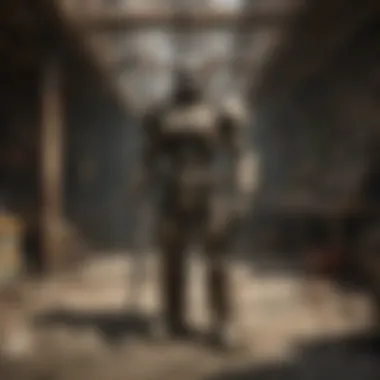
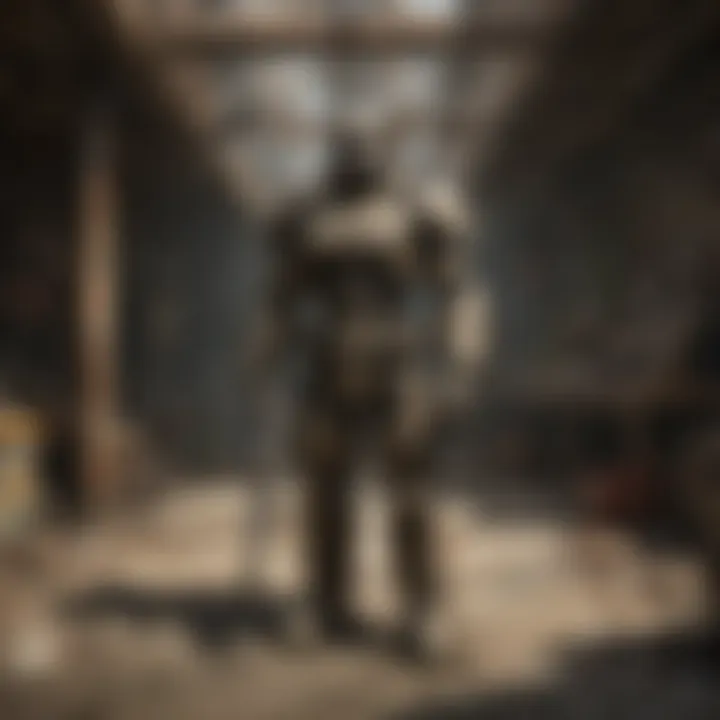
The enforcers, whether they be agents of the law or rogue factions, embody the tension between survival and moral obligation. In the chaotic aftermath of nuclear devastation, traditional concepts of justice have warped. Raiders, mercenaries, and even some factions like the Brotherhood of Steel may function as unwitting enforcers, imposing their own brand of order in environments rife with lawlessness.
- Law Enforcement in Fallout: In some regions, remnants of former law enforcement agencies still cling to their badges, formed into new groups tasked with restoring some semblance of order. However, their effectiveness is often hindered by corruption and the overwhelming influence of powerful gangs.
- Raiders as Enforcers: Interestingly, the raiders can also serve as enforcers in their own right, claiming territories and enforcing their brutal codes of conduct. Players who tread too close might find themselves at odds, negotiating for their lives instead of luxuries.
"In a world where greed and survival collide, the enforcers exercise power through fear, bending the law to their whims."
Maintaining a balance between survival and adherence to any form of law is crucial for players, who must navigate these complex interactions when dealing with chop shops.
Consequences of Operation
Operating a chop shop in Fallout carries significant risks, and the consequences can be far-reaching. With no governing body overseeing these operations, players quickly discover that their actions can lead to dire outcomes.
- Violent Retaliation: The lawless nature of the environment means that any perceived slight could provoke violent retaliation from gangs or factions seeking retribution. A player might choose to work with a chop shop, gaining valuable resources but subsequently drawing the ire of another faction.
- Legal Repercussions: For those players who choose to ally with the remaining law factions, aiding chop shops may bring legal repercussions, ranging from bounties to outright execution for treason against newly formed governments.
- Moral Implications: Beyond just physical consequences, players might grapple with moral dilemmas. Supporting chop shops might mean engaging in activities that can disturb one’s own ethical compass, leaving them questioning their choices.
Engaging with chop shops offers immediate gratification but at potentially catastrophic costs. Understanding the landscape of legality and enforcement can be a game-changer in navigating the dangerous waters of the Fallout universe.
Challenges Faced by Chop Shops
The chop shops in the Fallout universe operate in a realm where survival is paramount. Yet, their daily struggles reveal a deeper narrative about post-apocalyptic life. It is crucial to explore the challenges these chop shops face because they reflect not just the mechanical aspects of gameplay, but also the underlying themes of scarcity, competition, and morality woven into the fabric of the Fallout storyline. Understanding these challenges helps players appreciate the nuanced environment they navigate and the tough choices they have to make.
Resource Scarcity
One of the most pressing issues facing chop shops is the scarcity of resources. In a world ravaged by nuclear fallout, the availability of materials is a constant concern. Components that chop shops depend on—like scrap metal, wiring, and various mechanical parts—are not only hard to find but also heavily contested. Players often stumble upon abandoned vehicles, wrecked buildings, and forgotten bunkers in search of these valuable materials.
As demand for makeshift vehicles and weaponry rises, chop shops find themselves in a precarious position. With fewer resources, prices soar, and those with means may exploit the desperate. This creates a ticking clock for both shop owners and customers, driving tension and urgency into interactions.
"A well-stocked chop shop can be your best friend in the wasteland, but when they're short on supplies, even the most resourceful scavenger has to think twice before heading in for repairs or upgrades."
To navigate resource scarcity, many shop owners form alliances or trade pacts with raiders, settlers, and even other chop shops. This interconnected economy emphasizes the desperate conditions these businesses operate under. Players therefore not only have to strategize their scavenging expeditions, but also consider their relationships with other groups in the wasteland, making resource management vital to survival.
Competition Among Raiders
In addition to battling resource scarcity, chop shops must contend with fierce competition among raiders. These groups often see chop shops as potential goldmines, aiming to pilfer supplies or demand protection money for leaving them unscathed. The cutthroat nature of the wasteland, where strength often dictates success, means chop shop owners must either band together for mutual survival or fortify their operations to deter raids.
This competition introduces an interactive layer within gameplay, as players may find themselves siding with certain factions or engaging in skirmishes to protect their chosen chop shop. The dynamics of rivalries can shape the player's experience dramatically—crafting alliances may provide resources and protection, while choosing neutrality could lead to devastating losses.
- Key points of concern with competition include:
- Financial viability: Raiders often disrupt commerce, making it challenging to sustain operations.
- Security: Constant threats result in the need for defensive measures, consuming resources and manpower.
- Innovation: Competitors may adopt ruthless tactics, forcing shop owners to be cunning in their business strategies.
Given these challenges, chop shops symbolize resilience in a chaotic world. They are not just places for modification or repairs; they embody a struggle for survival, where each decision weighs heavily on the balance of power in the wasteland.
Impact on Player Decision Making
In the Fallout universe, chop shops serve as more than just illicit operations; they impact the very fabric of player interactions and decision-making processes. Players navigate a landscape where choices echo beyond immediate benefits. Here, the weight of every decision can shape not just individual narratives, but also the wider game world. Understanding this impact is crucial for players wishing to delve deep into the socio-economic and moral quandaries presented throughout the series.
The ability to make informed decisions in fallout's unpredictable landscape hinges on several key aspects:
- Resource Management: Players often face choices that affect their resources. Do you trade valuable items at a chop shop for quick survival and gear enhancement, or do you hold onto them for potential future engagements?
- Moral Consequences: Associating with a chop shop might provide immediate rewards, but at what cost? Each association can lead to further complications, adding layers to the player’s moral standing in the game.
- Community Relations: Engaging with these illicit stops can alter players' relationships with factions. A player’s choice to barter with raiders could lead to strong alliances or bitter rivalries, further complicating future decisions.
"The decisions made at chop shops are often a reflection of larger themes in Fallout—survival, ethics, and survival amidst chaos."
Ultimately, understanding the implications of these chop shops helps players navigate the intricate web of choices that define their journey within the Fallout universe.
Informed Choices in Gameplay
Informed decision-making in Fallout involves a careful evaluation of the relationships between players, chop shops, and the broader game world. Players might encounter various scenarios where they must weigh options heavily upon their immediate survival versus the long-term consequences of their actions.
- Research and Knowledge: Knowing where chop shops are located and what they offer can turn the tide of gameplay. Players gather intel through exploration and dialogue, forming a more comprehensive understanding of the context in which they operate.
- Understanding Factions: Each chop shop is often influenced by numerous factions. Deciphering these affiliations can result in powerful alliances or potentially disastrous betrayals. For instance, dealing with a chop shop run by raiders may provide unique weapons, but it also risks incurring the wrath of other groups.
A player might thus become savvy about the intricate relationships that govern the wasteland. This knowledge translates to more effective strategy formulations and enhances overall gameplay engagement.
Strategies for Engagement
Players looking to maximize their chop shop experiences can adopt various strategies that enhance engagement:
- Trading Wisely: Consider what items are most valuable in different contexts. A weapon or piece of armor might fetch a higher price or better offers at specific chop shops.
- Building Relationships: Engaging with NPCs positively can lead to better deals, information, and even quests. A good rapport might provide insider tips on upcoming raids or impending dangers, thus preparing players for unforeseen situations.
- Analysis of Risks vs. Rewards: Laying out potential rewards against the risks from local factions is crucial. For instance, venturing into a chop shop run by cutthroats can offer substantial loot, but that treasure comes with the threat of violence.
In summary, these strategies demonstrate that decisions in chop shops substantially affect a player’s progress and overall experience. The intricate dance of risk assessment and relationship building within this space enriches the gameplay, encouraging players to think critically at each juncture.
Future of Chop Shops in Fallout
The evolution of chop shops within the Fallout universe is a subject ripe for exploration. As the Fallout series continues to expand, understanding how chop shops will develop can provide intriguing insights into not only the mechanics of gameplay but also the implications for narrative and player engagement. Chop shops encapsulate the harsh realities of survival in a fractured world, and their future evolution could deeply influence player experiences and the broader lore of the game. Incorporating new technologies, moral dilemmas, and character arcs are essential for keeping chop shops relevant, while also appealing to the storytelling strengths that define Fallout.
Potential Developments
Looking ahead, several potential developments regarding chop shops can be anticipated. First, we might expect to see an increase in their technological adaptations. In a world where technology is both rare and sought after, the introduction of advanced modification options for salvaged equipment could enhance gameplay. Imagine a chop shop that specializes in upgrading weapons with pre-war tech or even new crafting options that allow players to mix and match pieces for unique designs.
- Expanded Crafting Mechanics: Players could gather resources through side quests and exploring the wasteland, bringing them back to a chop shop for customization.
- New Characters and Factions: The emergence of new factions that have differing philosophies towards chop shops could create intense political dynamics. For example, a group that views chop shops as essential for survival might clash with a moralistic faction that aims to dismantle them for ethical reasons.
- Expansion of Locations: As players venture to new areas, encountering diverse chop shops could provide richer lore, showcasing how different cultures in the wasteland engage with salvaged technology.
These developments could remain true to the core of Fallout, maintaining the series' identity while pushing boundaries to explore fresh narrative layers.
Expectations of Players
Fallout players have high expectations when it comes to chop shops. They are not merely looking for functional spaces but places imbued with rich content and emotional weight.
- Deeper Gameplay Integration: Players desire more than just a stop-off for quick fixes. Looking for immersive experiences, expectations for chop shops could include in-depth storytelling elements that tie directly into player decisions. Choices made in these spaces might resonate later in the narrative.
- Community Engagement: As new online modes are introduced, players may expect chop shops to function as hubs for social interaction, enabling trading and crafting with other players, enhancing connectivity.
- Evolving Morality: The choices players make in chop shops should carry heavier consequences. If a player chooses to exploit the chop shop system for personal gain, the game's narrative could reflect that through altered relationships with non-player characters.
Highlighting these considerations can lead to a more enriching gameplay experience that resonates with Fallout’s themes of survival and moral ambiguity, while also providing players with a sense of ownership over their narrative arcs. The future of chop shops could very well forge new paths within the Fallout landscape, continuing to captivate an audience that embraces both creativity and consequence.
The End
The examination of chop shops within the Fallout universe is essential not only for grasping the narrative's complexity but also for understanding how these illicit operations shape player experiences and decisions. Chop shops serve as a microcosm reflecting the post-apocalyptic world’s moral quandaries, where survival often necessitates uncomfortable choices. They highlight the thin line between necessity and morality in a landscape stripped of societal norms.
Summary of Key Insights
Throughout this article, we have explored several pivotal aspects regarding chop shops:
- Narrative Significance: Chop shops are tightly woven into the storyline of Fallout. They provide critical background and depth to the struggles faced by various factions.
- Gameplay Mechanics: These locations affect how players gather resources, make decisions, and interact with NPCs.
- Cultural and Ethical Reflections: The morality of engaging with these operations presents dilemmas, prompting players to question their own values.
- Economy and Trade: The way chop shops facilitate trade illustrates the resourcefulness and adaptability of survivors in the wasteland.
As players navigate this treacherous landscape, their interactions with chop shops reveal deeper truths about human nature and societal structures in times of crisis.
Final Thoughts on the Chop Shop Phenomenon
The chop shop phenomenon in Fallout transcends mere gameplay mechanics; it is a deeply embedded component of the game's lore that prompts rich storytelling and player engagement. It serves as a reminder of what people will do to survive when faced with constraints and scarcity.
Additionally, their representation in Fallout reflects broader themes of capitalism and morality. Players are left with lingering questions about the influence of their choices.
In the end, the chop shop is not just a physical location but a narrative device that enriches the player's journey through the complexities of the Fallout universe. As players return to these settings, they bring with them the weight of their decisions, reinforcing the idea that every choice matters in the wasteland.
